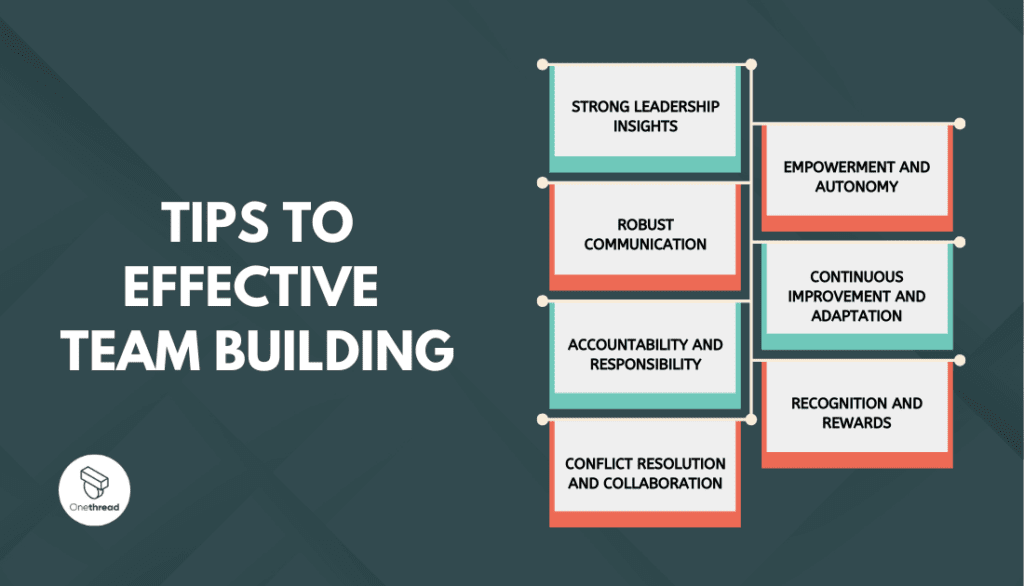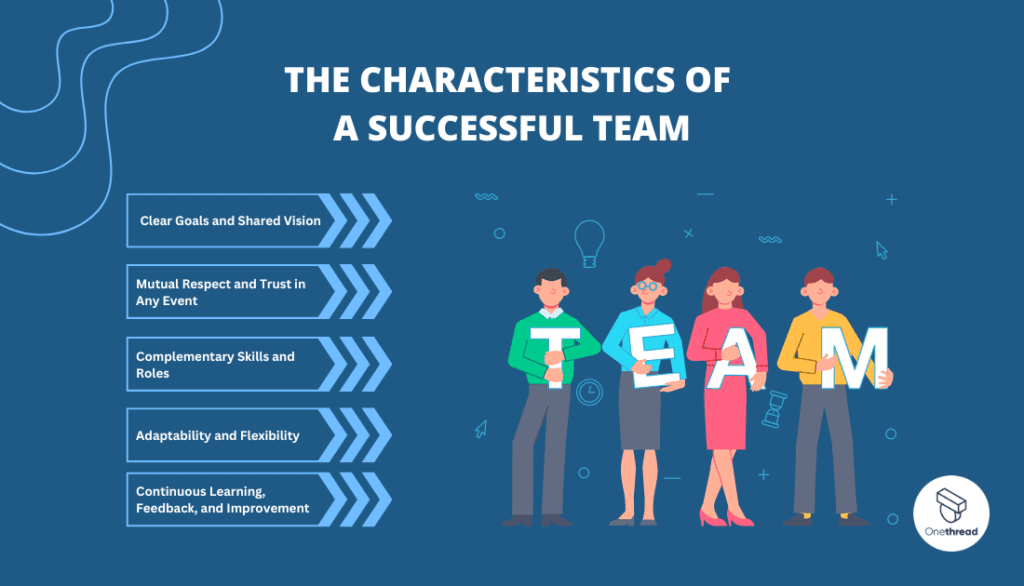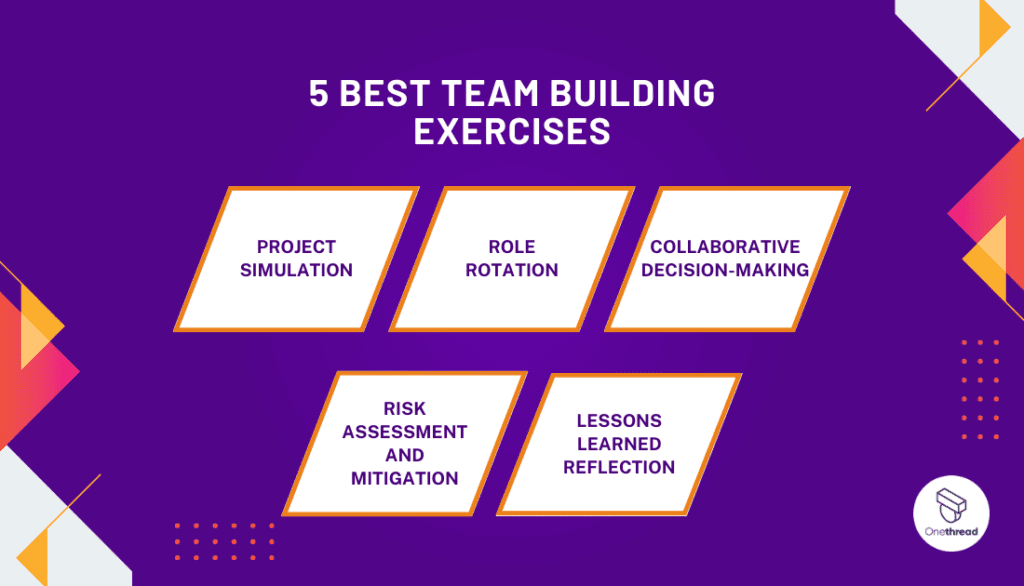Are you ready to dive into the fascinating world of successful teams? Whether you’re a team leader, a member, or someone aspiring to build a thriving team, you’ve come to the right place. In this article, we’ll explore 6 ways successful teams are built to last.
We all know that teamwork makes the dream work, but building and maintaining a successful team is no easy task. It’s like constructing a sturdy building; each component needs to be carefully designed and skillfully put together.
But fear not! We’re here to guide you through the process, sharing insights and practical tips to help you foster a team that stands the test of time. Ready to explore the six ways successful teams are built to last? Let’s get started!
6 Ways Successful Teams Built Last: Tips to Effective Team Building

Building a successful and enduring team requires a thoughtful approach and a focus on key elements that foster long-term success. Here are six essential strategies to build teams that stand the test of time.
Strong Leadership Insights
Effective leadership plays a crucial role in building a successful team. A strong leader inspires, guides, and empowers team members. They provide direction, support individual growth, and foster positive team culture. With capable leaders at the helm and effective leadership insights, a team with great culture works for long-term success.
Robust Communication
Open and effective communication is the lifeblood of building a successful team. Encouraging transparent and regular communication among team members fosters trust, facilitates collaboration, and ensures that everyone is informed.
Active listening, clear feedback, and good constructive dialogue create a supportive and cohesive team environment.
Accountability and Responsibility
Accountability ensures that team members take ownership of their actions and commitments. By holding ourselves and each other accountable, we establish a culture of reliability and trust. Clear expectations, transparent feedback, and a shared sense of responsibility contribute to the team’s long-term success.
Conflict Resolution and Collaboration
In any team, conflicts are inevitable. Successful teams proactively address conflicts and prioritize collaboration. By fostering a safe and respectful environment for open dialogue, we can resolve conflicts constructively.
Embracing different viewpoints and seeking win-win solutions strengthens team dynamics and builds resilience which is essential to create a good team.
Empowerment and Autonomy
Empowering team members by providing them with autonomy and decision-making authority promotes their growth and engagement. When individuals feel trusted and empowered, they are more motivated to contribute their best efforts. Encouraging autonomy also nurtures innovation and fosters a sense of ownership within the team.
Continuous Improvement and Adaptation
To build teams that last, we must embrace a culture of continuous improvement. Regularly evaluating team processes, seeking feedback, and implementing necessary adjustments allow us to adapt to changing circumstances.
A team that constantly learns from its experiences and evolves becomes stronger and more resilient.
Recognition and Rewards
Recognizing and celebrating the achievements of team members is crucial for building a positive and supportive team culture. Expressing gratitude and acknowledging individual and collective successes boosts morale and motivates team members to excel.
Rewarding exceptional performance reinforces the value of their contributions and inspires continued dedication.
Why Building Successful Teams Important?

Teamwork is the backbone of successful project management. It’s like having a group of superheroes working together towards a common goal.
When we collaborate effectively, we harness the collective power of diverse skills, knowledge, and perspectives. Let’s explore why teamwork is so crucial in project management.
Sharing the Workload
In project management, tasks can be complex and demanding. By working as a team, we distribute the workload more efficiently, ensuring that no one person is overwhelmed.
We can tap into each team member’s strengths and expertise, making the project execution smoother and more effective.
Harnessing Diverse Perspectives of People
Every team member brings a unique set of experiences and viewpoints to the table. By encouraging open communication and collaboration, we tap into this diversity.
We can explore different angles, identify potential challenges, and come up with innovative solutions that we may have overlooked as individuals.
Enhancing Problem Solving
Projects are bound to encounter obstacles along the way. When we work as a team, we pool our problem-solving skills. We can brainstorm together, analyze different options, and find creative ways to overcome challenges. This collaborative approach often leads to more robust and effective solutions.
Fostering Creativity and Innovation
Teamwork sparks creativity. By bouncing ideas off one another, we stimulate innovation and generate fresh perspectives. Collaborative working environments provide a safe space for brainstorming and experimentation, leading to breakthrough ideas that propel projects forward.
Boosting Motivation and Accountability
Being part of a team creates a sense of belonging and shared responsibility. When we know that our efforts impact the team’s success, we are motivated to perform at our best.
Additionally, team members hold each other accountable, ensuring that everyone stays focused, meets deadlines, and delivers quality work.
Build a Supportive Network
Teamwork cultivates a supportive and encouraging work culture. When we face challenges or experience setbacks, we can rely on our teammates for support, guidance, and motivation. This network of support helps us overcome obstacles, stay resilient, and ultimately achieve project success.
What Are the Characteristics of a Successful Team?

A successful team is like a well-oiled machine, where each part works harmoniously to achieve greatness. Let’s explore the key characteristics that define a thriving and high-performing team.
Clear Goals and Shared Vision
A successful team starts with a clear understanding of its goals and a shared vision. When we align our objectives and work towards a common purpose, we create a strong foundation for collaboration and productivity.
Mutual Respect and Trust in Any Event
A successful team is built on a foundation of mutual respect and trust. We value each team member’s contributions, ideas, and expertise.
By trusting and supporting one another, we create a environment where everyone feels empowered to take risks, share their opinions, and collaborate freely.
Complementary Skills and Roles
Successful teams comprise members with diverse skill sets and roles that complement one another. Each team member brings unique strengths to the table, allowing for a more comprehensive and well-rounded approach to problem-solving and task execution.
Adaptability and Flexibility
In a dynamic work environment, adaptability is crucial. A successful team embraces change, remains flexible, and is willing to adjust its plans and strategies as needed.
Being open to new ideas and approaches ensures that the team can navigate challenges and seize opportunities effectively.
Continuous Learning, Feedback, and Improvement
A successful team values continuous learning and improvement. We encourage a culture of innovation and personal growth, where team members are encouraged to expand their knowledge, develop new skills, and share insights.
By constantly striving to improve, the team can stay ahead of the curve and deliver exceptional results.
5 Best Team Building Exercises – How Strong Teams Are Built

Team-building exercises play a vital role in fostering collaboration, strengthening relationships, and improving overall project performance. Here are five highly effective team-building exercises specifically tailored to project management teams:
Project Simulation
Engage in a project simulation exercise where team members collaborate to solve a realistic project scenario. This hands-on activity allows the team to apply project management principles, make decisions, and work together to achieve project objectives. It enhances problem-solving skills, communication, and coordination within the team.
Role Rotation
Encourage team members to take turns in different project roles or responsibilities. This exercise provides a deeper understanding of each other’s roles, promotes empathy, and fosters a sense of shared responsibility.
It also strengthens collaboration as team members gain a broader perspective of the project and learn to support one another. This is how effective teams are created.
Collaborative Decision-Making
Conduct a collaborative decision-making exercise where the team faces project-related challenges and must collectively make decisions.
Encourage open discussion, active listening, and consensus-building. This exercise strengthens critical thinking, teamwork, and the ability to reach agreement on important project matters.
Risk Assessment and Mitigation
Facilitate a risk assessment and mitigation exercise where the team identifies potential project risks, evaluates their impact, and develops strategies to mitigate them. This activity enhances risk management skills, collaboration, and proactive problem-solving within the team.
Lessons Learned Reflection
Conduct a lessons-learned reflection session at the end of a project or project phase. Gather the people of the team to discuss successes, challenges, and insights gained during the project.
Encourage open sharing of experiences and business ideas for improvement among team members. This exercise promotes continuous learning, collaboration, effective team building, and a culture of reflection and growth within the team.
Ways to Become a Great Leader to Ensure Team Success

When it comes to project management, being a great leader can make all the difference between success and struggle. As leaders, it’s not just about overseeing tasks but also inspiring and empowering our team to achieve remarkable results.
Let’s explore some friendly and effective ways we can enhance our leadership skills to ensure our team’s success:
Communicate with Clarity
One of the fundamental pillars of successful leadership is clear communication. As leaders, we must articulate our vision, goals, and expectations in a way that everyone on the team can understand.
Keep the channels of communication open, encourage questions, and actively listen to the concerns and ideas of team members. Remember, it’s not just about conveying information; it’s about fostering a culture of openness and collaboration.
Lead by Example
As the old saying goes, “actions speak louder than words.” Let’s embody the values and work ethic we want to see in our team. When we lead by example, we inspire our members to follow suit, creating a positive and motivated work environment.
Delegate Wisely
We can’t do everything ourselves, and that’s where delegation comes in. Entrust tasks to team members based on their skills and strengths. Delegating not only lightens our workload but also empowers our team members by showing confidence in their abilities.
Provide Support and Encouragement
As leaders, we need to be more than just taskmasters; we must be supportive mentors. Offer guidance, constructive feedback, and encouragement throughout the project. Celebrate successes, both big and small, and acknowledge the efforts of every team member. Remember, a motivated team is a productive team.
Foster a Positive Team Culture
A positive team culture can significantly impact productivity and overall satisfaction. Encourage a sense of camaraderie, where everyone feels valued and respected. Promote teamwork and collaboration while recognizing individual contributions. When we create a supportive and inclusive atmosphere, the team will thrive.
Embrace Adaptability
Projects can be unpredictable, and as leaders, we must remain adaptable and flexible. Embrace change and demonstrate resilience in the face of challenges. By staying open to new ideas and approaches, we can inspire the same adaptability in our team, making them more equipped to handle any obstacles that come their way.
Continuously Learn and Improve
Great leaders never stop learning. Seek opportunities to enhance our project management skills through courses, workshops, and by learning from experienced peers. Emphasize a growth mindset within the team and encourage everyone to take their professional development seriously.
Respect Work-Life Balance
While we strive for project success, it’s essential to respect the work-life balance of our team members. Encourage reasonable working hours, time off when needed, and support for personal obligations. A well-rested and balanced team will be more productive and engaged.
Remember, leadership is a journey of constant improvement. By adopting these friendly and inclusive practices, we can become the kind of leader who empowers our team, drives project success, and fosters a positive and collaborative work environment for everyone involved. Let’s embark on this journey together and achieve greatness as leaders!
Final Words
By implementing the 6 ways successful teams are built to last, you can create a strong and resilient team that achieves remarkable results. Trust and respect form the foundation, while effective communication, clear roles, and shared goals keep us aligned and motivated.
Embracing diversity, continuous learning, and adaptability ensure that we stay ahead of the curve. Together, we can foster a supportive and collaborative team environment where everyone thrives. So, let’s apply these six steps, nurture our teams, and build a lasting legacy of success. The journey starts now!
